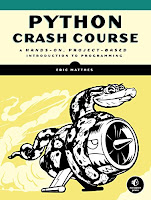
This post has my answers for "Check Your Understanding" questions in section 1.3, Chapter 1 of the book Programming Language Pragmatics by Michael L. Scott.
Chapter 1, Section 1.3 - Check Your Understanding
Question #1: What is the difference between machine language and assembly language?
Machine language is written using the instructions set of the processor directly. Each operation supported by the processor is given a code using which the operation is carried out. The code written in Machine language will be in hexadecimal. But in the case of assembly language the program is written using mnemonic (often represented as operations such as MOV, STORE, ADD, SUB etc) which later translated to machine instructions by software called assembler. The assembly language also has provisions for macro definition which expanded by assembler before producing machine code.
Question #2: In what way(s) are high level languages an improvement on assembly language? In what circumstances does it still make sense to program in assembler?
While assembly language is faster to execute, high-level languages can be easily learnt by programmers, ported to varied architecture without requiring to rewrite entire logic on many architectures and saves programmers time since high-level languages are not one-to-one mapping of machine instructions. High level languages often use functions (in the context of mathematical functions) to produce highly expressive code. However assembler will be default choice for system specific performance reasons.
Question #3: Why are there so many programming languages?
There are several programming languages because of the following reasons - evolution, special purpose, personal choice,
Question #4: What makes a programming language successful?
The programming languages are successful because of one or several of the following reasons - expressive power, Ease of use, ease of implementation, standardization, open source, excellent compilers, economic, patroage and internia.
Question #5: Name three languages in each of the following categories: von Neumann, functional, object-oriented. Name two logic languages. Name two widely used concurrent languages
von Neumann - C, Ada, Fortran
Functional: Haskell, ML, Scheme
Object-oriented: Java, C++, Smalltalk
Logic Languages: Prolog, spreadsheets
Concurrent Languages: C++, Java
Question #6: What distinguishes declarative languages from imperative languages?
Imperative languages solves a problem by sequence of steps with each steps produces some side effects. The imperative language focuses on how a problem should be solved rather than what to do. The declarative languages on the other hand focuses on what needs to done.
Question #7: What organizations spearheaded the development of Ada?
US Department of Defence
Question #8: What is generally considered the first high-level programming language?
FORTRAN?
Question #9: What was the first functional language?
Lisp, Scheme?
Question #10: Why aren't concurrent languages listed as category in Figure 1.1?
Concurrency support is available in many of languages such as Java, C++ and C. Several concurrency packages are available as language extensions




